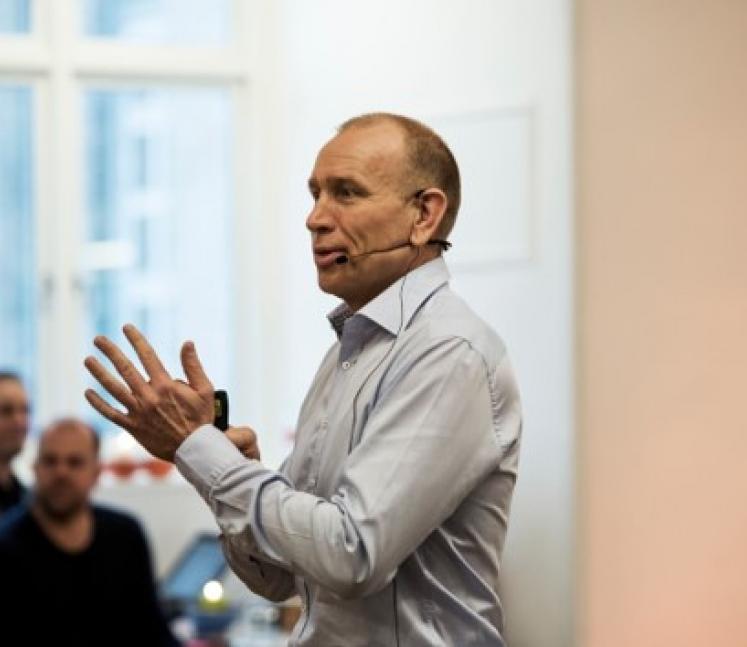Transcript - Double the impact in half the time
00:32
only a few times during a long career do
00:37
you face a big idea and really big idea
00:44
one that potentially if nurtured right
00:48
might become bigger than yourself you
00:53
don't know it but you have this feeling
00:56
and honestly I have this feeling right
01:00
now it's a simple idea with a huge
01:05
impact but but let me take you a little
01:12
bit back in time back to 1968 I lived in
01:20
just 10 kilometers north of community
01:22
it's about 5 kilometers that way
01:25
in a typical suburb with the villas from
01:30
the 1920s mixed up with industrial areas
01:38
this is me and my friends the is in the
01:44
middle is me and we played we played
01:50
football on the lawn in front of the
01:54
porcelain factory you can see there
01:57
every afternoon please follow me on this
02:03
journey so please close your eyes
02:05
everybody close your eyes and feel the
02:10
heat from the big ovens smell the scent
02:17
of metal hear the noise from the
02:22
conveyence and see the fine dust all
02:28
over the area
02:39
this is the sound of the factory whistle
02:44
can you imagine the big crowd of men and
02:48
women dressed in blue running out of the
02:51
main gate
02:52
that afternoon smell the dark on
03:01
your brand-new sneakers that your mom
03:04
told you not to play football in yeah
03:08
please open your eyes
03:11
this is 1968 in Olympia and by the way
03:14
this is my brother and this is Limpy
03:25
today the postman Factory is long gone
03:31
they produce Boston elsewhere in the
03:34
world but even though the factories are
03:38
gone they're actually more workplaces in
03:41
limpid nowadays than there was in 1968
03:47
but there are very few people in
03:49
Google's people in Olympia actually
03:53
dresses or dress like you do and like I
03:56
do so so it's it's a different if it's a
04:03
different city and and this dramatic
04:08
change in in the workforce has happening
04:11
during these 50 years it has happened in
04:15
room it has happened in the rest of the
04:18
Western world as you can see here on
04:23
this slide there are entry more
04:26
workplaces but different works
04:30
workplaces very different the people
04:34
that go to work in the Western world
04:35
today they do another type of work they
04:42
do management
04:44
they do logistics they do Rd they do
04:50
admin they do all kinds of strange jobs
04:55
sometimes named knowledge work let's
05:01
just call it white-collar Chile this
05:05
type of work that they do you do I do is
05:13
to a very large extent what I would call
05:17
one of assignments and that actually has
05:20
the name it's called a project it's
05:26
actually a project Factory a project
05:32
Factory and that project Factory is part
05:37
of a project society welcome to the
05:43
project society
05:46
22% of the world's GDP is actually
05:50
projects and that number are increasing
05:56
pretty rapidly so if you look into the
06:01
Western world 35 percent of the GDP in
06:05
the Western world was projects in 2010
06:09
and in 2020 it's predicted to be 40
06:14
percent so welcome to the project
06:19
society with a lot of project factories
06:22
only 1/3 of all the projects that we do
06:29
I actually successful projects and that
06:34
number hasn't really changed for the
06:39
past 50 years of course the nature of
06:44
projects is that it contains uncertainty
06:47
so the number will never become 100 but
06:52
we haven't really seen any project Civet
06:56
during the last 50 years we are actually
07:02
really I'm sorry to say really
07:04
unproductive could you keep this one
07:10
just one thing this this chair in the
07:16
same 50 years has become 2 to 3 percent
07:21
cheaper or better every year meaning
07:27
that if you do the math it has become
07:32
four times better or four times cheaper
07:35
or 2 times better and 2 times cheaper
07:38
whatever you prefer in those 50 years
07:45
this is an F and a fantastic achievement
07:49
done by the blue men and women in our
07:55
lean product factories if and I do say
08:01
if we had seen the same development in
08:05
project CPG we would actually be able to
08:10
deliver projects with of the impact in
08:15
half the time today that the classic
08:19
protect management with you could say
08:22
approach is inherited from the days of
08:25
the porcelain factory the days where the
08:29
world was pretty stable and at a time
08:34
when success was to deliver what you
08:39
promised to deliver a project out of the
08:45
project to deliver on time on cost and
08:51
on quality to deliver in accordance with
08:55
a plan or a contract
09:02
we need to rethink that and the idea of
09:06
rethinking product management is not new
09:08
it has been around in the academic world
09:09
for the past 20 years from product focus
09:18
to impact folks we need an agile
09:27
approach we need agility and we have
09:31
seen agile methodologies in software
09:34
development we have seen new working
09:37
methods in the software in the tech
09:39
companies but we need a radically
09:46
different approach to the discipline of
09:49
project management and is the surprise
09:59
we know the ingredients because there
10:02
are so many so many great projects to
10:05
study out there and there's the second
10:09
surprise nobody had has really put these
10:14
ingredients together we did that we did
10:20
that together with 10 leading global
10:24
organizations leading global project
10:27
veterans and a fabulous community of
10:30
more than 1500 practitioners and the
10:36
result it's they have government
10:41
ethology
10:42
and it's really simple it's about
10:48
putting an extreme focus on three core
10:52
elements impact flow and leadership we
10:59
have done more than twenty half-double
11:01
projects in implementers we have on
11:05
average reduced the lead time by 40%
11:11
and we actually developed the concept as
11:15
we did that it's extremely powerful a
11:21
project without impact is basically
11:25
waste you the project manager of the
11:32
project leader or the project sponsor
11:34
you are responsible for delivering
11:36
impact not only the product when I did
11:46
my PhD thesis I spent three years
11:50
conducting experiments writing papers
11:54
and writing a 533 patents report
12:00
nobody except my introvert Swedish
12:06
professor has ever read that we thought
12:11
it's a complete waste what I've asked
12:19
success is not to deliver what you
12:22
originally planned success is to create
12:29
implant or stakeholder satisfaction the
12:36
secret of half novel is actually very
12:39
simple is to create impact why you
12:43
deliver the product not after the
12:49
product is delivered so if you want to
12:55
write a book have the audience read the
12:58
book before it's printed we actually did
13:02
that if you want to teach two years
13:06
curriculum in math do it in two weeks we
13:11
actually helped doing that if you want
13:14
to implement a new CRM system in a huge
13:17
organization to improve top-line insist
13:21
on impact in
13:23
- money not in two years time because
13:28
and dude small because you will learn as
13:32
you go along you will learn and start
13:40
with the impact case because that's
13:42
acted the tool for that very simple
13:45
insist on the shortest time to impact
13:48
because you will learn and remember that
13:54
in a constantly changing world the best
13:58
measure for impact is actually
14:02
stakeholder satisfaction that's why we
14:05
need a high frequency feedback mechanism
14:08
with the stakeholders
14:10
hence the posture we need flow with the
14:15
projects
14:17
it starts with co-located teams the
14:21
simplest trick so project symmetry in
14:24
the project factory this doesn't go
14:30
along very well with a classical
14:33
hierarchy where the line meridian once
14:38
you have control over the resources set
14:40
them free
14:42
we know from numerous studies that
14:47
co-located teams are radically more
14:49
innovative radically more productive
14:52
than distributed teams and if you
14:54
combine that with agile methods checked
14:58
visual painting Sprint's etc you create
15:03
flow you create energy it's extremely
15:07
powerful leadership 70 this number is
15:15
important 75% of all projects failure
15:19
failures are due to bad leadership 75%
15:27
the protect factories key resource is
15:33
human engagement
15:35
and human engagement is a function of
15:40
time talent and energy those good a
15:48
please could you stand up thank you
15:52
if you should know this is a human being
15:55
[Music]
15:57
it's not a machine is not a robot robot
16:02
it's a human it's a human being it has
16:04
feelings
16:10
it has feelings and it has to be
16:16
motivated on the time to deliver time
16:21
talent and energy thank you very much
16:27
humans don't like to be an activity in a
16:31
project name they don't like it they
16:37
don't like to be an activity in a
16:39
process diagram they want meaning that's
16:46
how humans function and fully engaged
16:53
teams of humans are capable of doing
16:57
amazing things the role of the project
17:02
sponsor is to create fully engaged
17:06
project veterans the role of the project
17:11
sponsor is not to be a heroic
17:16
decision-maker in a steering committee
17:19
every six weeks which means we have to
17:26
focus on very few important projects it
17:32
is my dream then we can unleash this
17:37
gigantic potential together
17:43
for our clients for the Society for
17:46
employment in all our projects thank you
17:52
very much for your attention thank you
17:55
so much

